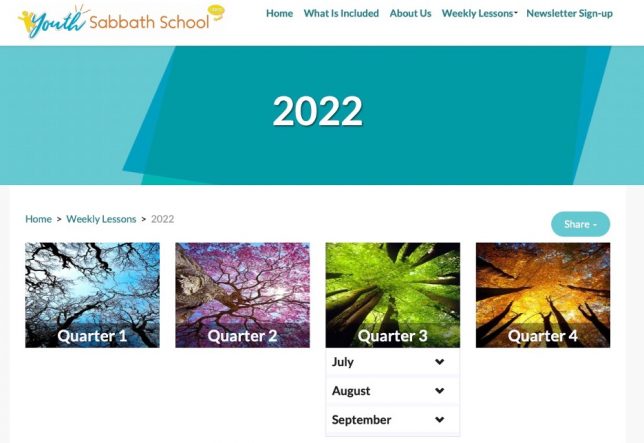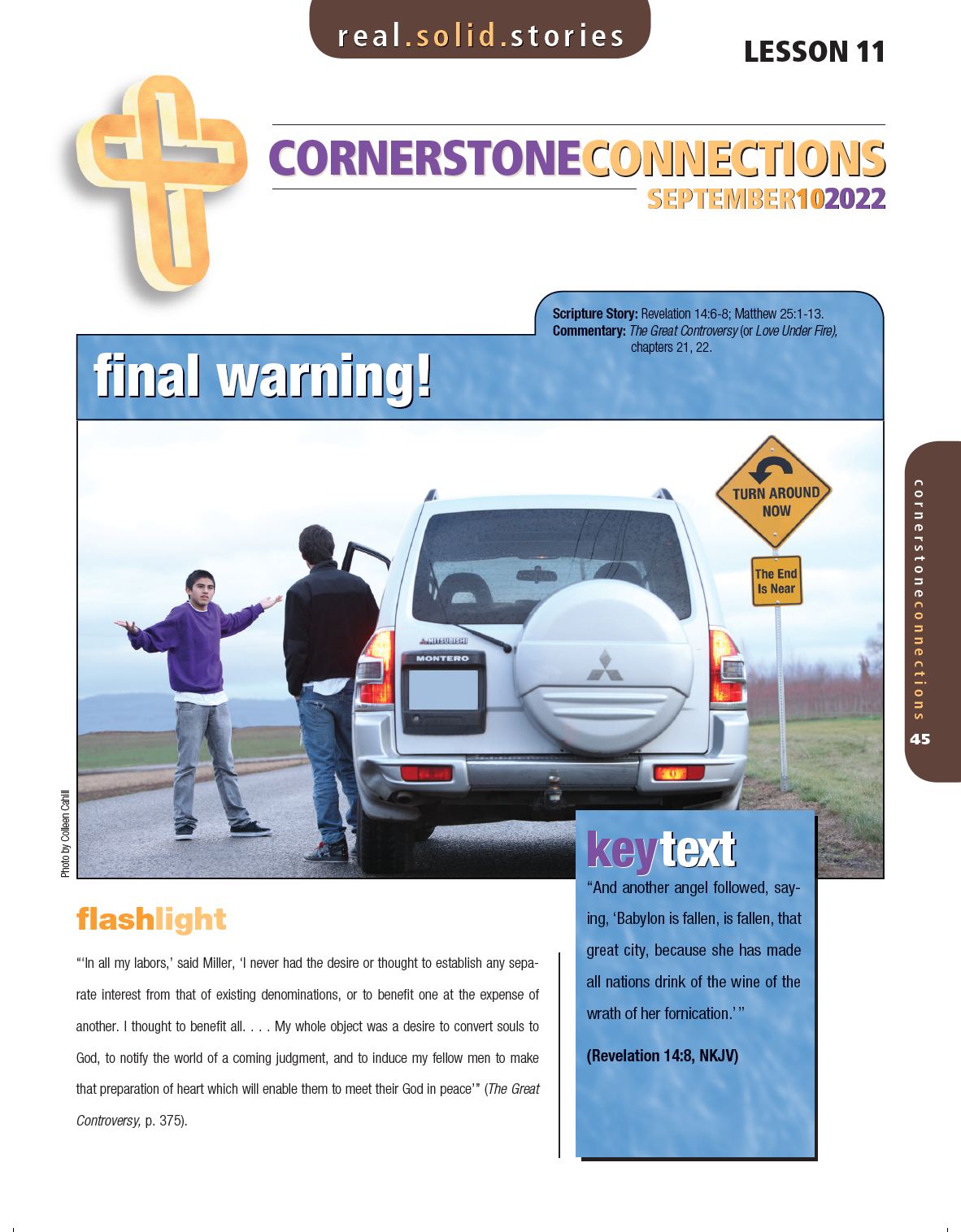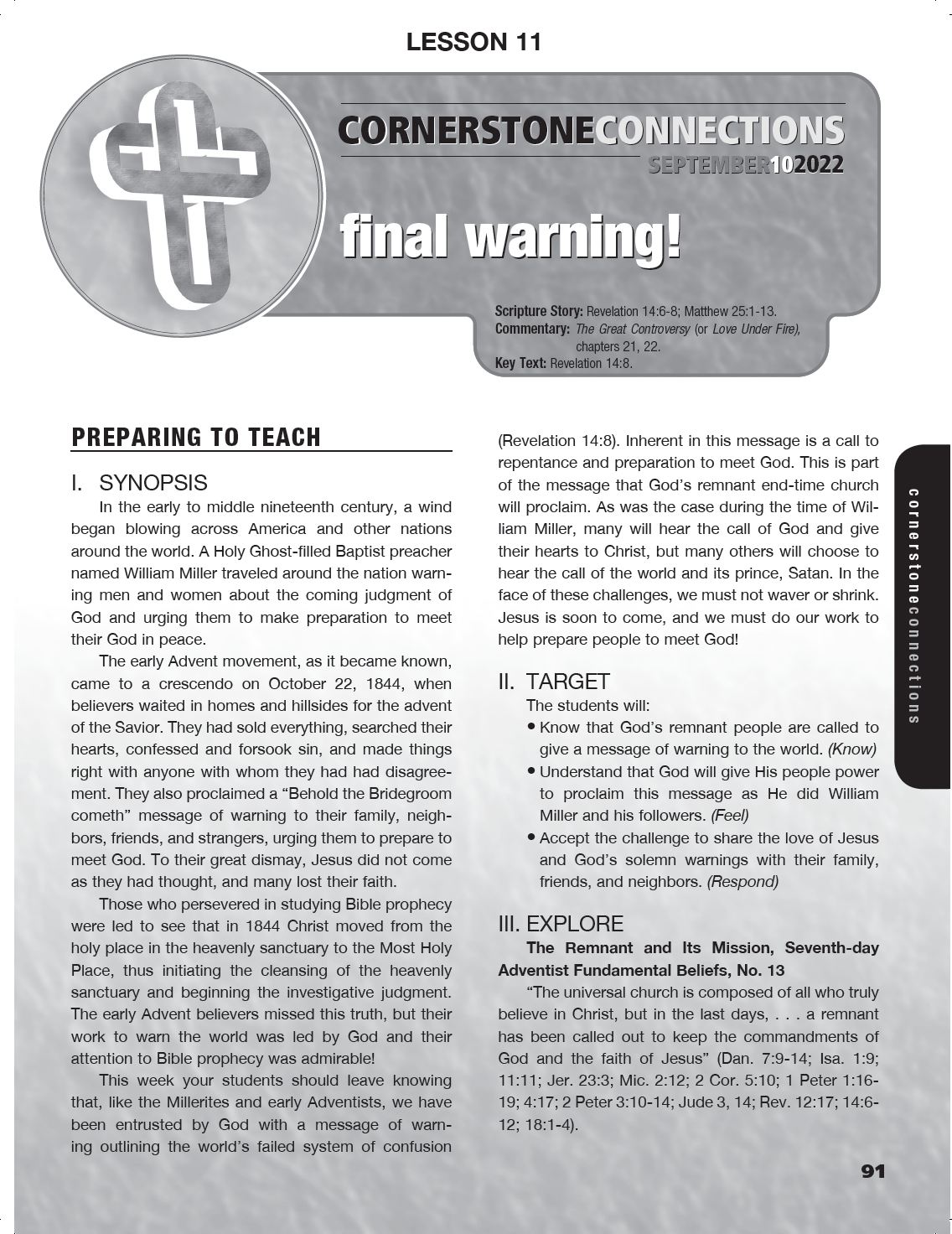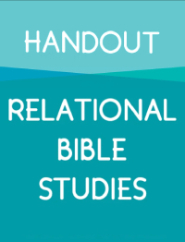“Final Warning!”
Click below to download the Cornerstone Connections leader’s guide and student lesson. This week’s resources also include two lesson plans and a discussion starter video which offer different ways of looking at the topic. Each lesson plan includes opening activities, scripture passages, discussion questions, and real-life applications.
Revelation 14:6-8
Matthew 25:1-13
The early Advent believers sold everything, and waited in their homes and on hillsides for the coming of Jesus. What are we willing to do in order to give a final warning message to the world?
Scripture Passages
OVERVIEW
The early Advent believers sold everything, and waited in their homes and on hillsides for the coming of Jesus. What are we willing to do in order to give a final warning message to the world?

OPENING ACTIVITY:
CHARACTER
Supplies: Index cards on which you have printed the word “Character,” each with one of the character traits listed below on the line beneath it:
Hand out one card to each student in your class. If your class has fewer than ten students, be sure to pass out a mix of positive and negative qualities. If your class has more, you may want to add additional traits.
Read the following scenarios to your students, then ask each one to describe how they think their character would respond to the situation, and then explain why.
QUESTIONS
TRANSITION
We look forward to the “time of trouble” as a time that will test us like never before, yet a thousand daily choices determine our destiny. In the parable of the ten virgins, the young women made the choice of whether or not to bring extra oil along before they ran out. If we’re to be ready for Earth’s final crisis, the time to get prepared is now.

BIBLE STUDY GUIDE
The Hour of His judgment
Let’s face it—this is one of the big texts in Adventism. Adventists see in their end-time mission the call to proclaim both the gospel and God’s coming judgment. It proclaims God as Creator, quoting the Sabbath commandment that memorializes His act of creation. And it is a warning, to beware of the deception of a counterfeit religious system—one that deceives millions into thinking it represents God.
It is a call to action. We are called to take the good news of Jesus “to every nation, tribe, language, and people,” and to rescue those trapped in deception and distortion. The end-time Babylon of which it speaks—in Revelation’s first reference to the metaphorical city—is a system both spiritual, distorting how people understand God’s character, and literal, with churches uniting with government to enforce their plans (a union described as “adulteries”). End-time Babylon’s greatest success may be to discourage people from believing in God at all, or to act religious only for selfish reasons.
These verses are also a call to worship God, pointing to worship as the core issue in Earth’s end-time crisis. Like Adam and Eve in the garden, we will have to choose between giving our allegiance to a clever counterfeit, or the one true God. That the call to worship God is presented with words from the Sabbath commandment points to the Sabbath playing an integral role in Earth’s end-time crisis.
Read Revelation 14:6-8.
6 Then I saw another angel flying in midair, and he had the eternal gospel to proclaim to those who live on the earth—to every nation, tribe, language and people. 7 He said in a loud voice, “Fear God and give him glory, because the hour of his judgment has come. Worship him who made the heavens, the earth, the sea and the springs of water.”8 A second angel followed and said, “ ‘Fallen! Fallen is Babylon the Great,’ which made all the nations drink the maddening wine of her adulteries.”
QUESTIONS
The Midnight Cry
Crisis reveals character.
The parable of the wise and foolish virgins (or bridesmaids) is a popular one among Adventists, but it’s not necessarily one of the best understood. Its message is usually boiled down to, “Be ready! If you’re not, it may be too late!” But there’s much more to the story than that.
The story of the ten bridesmaids is a parable of God’s people just before the Second Coming. The oil symbolizes the Holy Spirit, a reminder that each of us needs a personal connection to God to survive what’s coming. Our individual choices and habits matter, both now and for eternity.
In the parable, both the “wise” and “foolish” bridesmaids faced a crisis. Indeed, they all fell asleep—but when it was time to act, one group was prepared, and the other wasn’t.
The secret is to stay connected with God. Then, not only will we be ready for Jesus’ return, but in the meantime we’ll reflect God more and more each day. And as the Holy Spirit works in us and shines through us, as Ellen White described it, “The light will shine forth to penetrate and dispel the darkness. You cannot help shining within the range of your influence. The revelation of His own glory in the form of humanity will bring heaven so near to men that the beauty adorning the inner temple will be seen in every soul in whom the Saviour dwells. Men will be captivated by the glory of an abiding Christ. And in currents of praise and thanksgiving from the many souls thus won to God, glory will flow back to the great Giver” (Christ’s Object Lessons, p. 420).
Read with your students Matthew 25:1-13.
1 “At that time the kingdom of heaven will be like ten virgins who took their lamps and went out to meet the bridegroom. 2 Five of them were foolish and five were wise. 3 The foolish ones took their lamps but did not take any oil with them. 4 The wise ones, however, took oil in jars along with their lamps. 5 The bridegroom was a long time in coming, and they all became drowsy and fell asleep.
6 “At midnight the cry rang out: ‘Here’s the bridegroom! Come out to meet him!’
7 “Then all the virgins woke up and trimmed their lamps. 8 The foolish ones said to the wise, ‘Give us some of your oil; our lamps are going out.’
9 “ ‘No,’ they replied, ‘there may not be enough for both us and you. Instead, go to those who sell oil and buy some for yourselves.’
10 “But while they were on their way to buy the oil, the bridegroom arrived. The virgins who were ready went in with him to the wedding banquet. And the door was shut.
11 “Later the others also came. ‘Lord, Lord,’ they said, ‘open the door for us!’
12 “But he replied, ‘Truly I tell you, I don’t know you.’
13 “Therefore keep watch, because you do not know the day or the hour.”
QUESTIONS
Thief in the Night
Luke records this message and theme from Jesus told in a slightly different way.
Read Luke 12:35-40.
35 “Be dressed ready for service and keep your lamps burning, 36 like servants waiting for their master to return from a wedding banquet, so that when he comes and knocks they can immediately open the door for him. 37 It will be good for those servants whose master finds them watching when he comes. Truly I tell you, he will dress himself to serve, will have them recline at the table and will come and wait on them. 38 It will be good for those servants whose master finds them ready, even if he comes in the middle of the night or toward daybreak. 39 But understand this: If the owner of the house had known at what hour the thief was coming, he would not have let his house be broken into. 40 You also must be ready, because the Son of Man will come at an hour when you do not expect him.”
QUESTIONS
I Never Knew You
Christians often emphasize that following Jesus may be unpopular, but Jesus told of those who claimed His name for their own self-centered purposes.
Read Matthew 7:21-23.
21 “Not everyone who says to me, ‘Lord, Lord,’ will enter the kingdom of heaven, but only the one who does the will of my Father who is in heaven. 22 Many will say to me on that day, ‘Lord, Lord, did we not prophesy in your name and in your name drive out demons and in your name perform many miracles?’ 23 Then I will tell them plainly, ‘I never knew you. Away from me, you evildoers!
QUESTIONS
APPLICATION
The parable of the ten wise and foolish virgins challenges us to live with intention. We each have a major role to play in God’s end-time work. God calls us to both develop our relationship with Him day by day, and to shine for Him, that people may understand God’s character of love through our witness.
Consider:
QUESTION
What distracts us from focusing on Jesus?

SCRIPTURE PASSAGE
LEADER’S NOTE
For a Relational Bible Study (RBS) you’ll want to get into the Scripture passage and encourage the youth to imagine participating in the story while it’s happening. Then you will be able to better apply it to your own situation today.You will need to ask God for the Holy Spirit to be present as your small group discusses the questions (no more than 3-6 people in a group is recommended). Start with the opening question. It is a personal question and the answer is unique for each individual. There is no right answer and nobody is an expert here, so don’t be surprised when you hear different responses. You are depending on the Holy Spirit to be present and to speak through your group. Say what God prompts you to say, and listen to what others share.Take turns reading the chapter out loud. Follow that with giving the students some time to individually mark their responses to the questions (a PDF version of the handout is available as a download). This gives each person a starting point for responding when you start to share as a group. Next, begin the discussion by asking the students to share what they marked and why on each question as you work your way through. Feel free to take more time on some questions than others as discussion warrants.Encourage each person in the group to apply what is discussed to their personal lives and to share with the group what they believe God wants them to do. Then ask them to pray that God will help each of them to follow through in doing so. Remind them to expect that God will show them ways to live out the message of this passage in the coming week, and that they are free to ask others in the group to help hold them accountable.
OVERVIEW
When Adventists look to the Bible for signs of Christ’s promised return, we usually go to Matthew 24. Christ gave this warning from the Mount of Olives overlooking Jerusalem. The disciples had just spoken admiringly about the temple and Jesus warned that it would all be destroyed soon.
Shocked and defensive, the disciples asked, “When will this happen, and what will be the sign of your coming and of the end of the age?” (Matthew 24:3 NIV). Jesus gave them signs (vs. 30) as well as things that were NOT signs (vs. vs. 6).
But we’re still left to wonder if these related to the destruction of the temple in AD 70 or Christ’s second coming or both. Tomorrow is September 11, the infamous date in recent U.S. history when the twin towers in New York City crumbled to the ground when terrorists crashed airplanes into the buildings. Your teens weren’t alive when that happened, but many of the adults in your church remember it well. That was the “end of the world” for many people in different ways. Catastrophes continue throughout the world. Sometimes multiple ones occur around the same time. Natural disasters and human-made disasters create death and destruction. We wonder if we have reached the end of the world. Could things get any worse?
Our RBS (Relational Bible Study) moves beyond Matthew 24 to the continuation of Christ’s warning to the people. Jesus gave three parables to let His followers know how to live as they wait for His return. These are practical because they focus on the “HOW” (to live) rather than the “WHAT” (is going to happen and when). Because they are parables, they emphasize a few certain things, but that doesn’t mean each element of each parable has significance. It will be up to us, led by the Holy Spirit, to discern the message Jesus gave in parable form.
Those three parables are the wise and foolish bridesmaids/virgins, the talents, and the sheep and goats. While each of these has helpful guidance, we will focus on just the first one in Matthew 25:1-13. Are you ready for the wedding—the coming of the bridegroom? What does it take to be ready?
Ready and Waiting
Describe a time when your cell phone ran out of battery power.
Read Matthew 25:1-13.
1 “At that time the kingdom of heaven will be like ten virgins who took their lamps and went out to meet the bridegroom. 2 Five of them were foolish and five were wise. 3 The foolish ones took their lamps but did not take any oil with them. 4 The wise ones, however, took oil in jars along with their lamps. 5 The bridegroom was a long time in coming, and they all became drowsy and fell asleep.6 “At midnight the cry rang out: ‘Here’s the bridegroom! Come out to meet him!’7 “Then all the virgins woke up and trimmed their lamps. 8 The foolish ones said to the wise, ‘Give us some of your oil; our lamps are going out.’9 “ ‘No,’ they replied, ‘there may not be enough for both us and you. Instead, go to those who sell oil and buy some for yourselves.’10 “But while they were on their way to buy the oil, the bridegroom arrived. The virgins who were ready went in with him to the wedding banquet. And the door was shut.11 “Later the others also came. ‘Lord, Lord,’ they said, ‘open the door for us!’12 “But he replied, ‘Truly I tell you, I don’t know you.’13 “Therefore keep watch, because you do not know the day or the hour.
1. What does Christ’s parable of the 10 bridesmaids/virgins illustrate?
2. What’s the difference between the foolish and wise bridesmaids?
3. Why did the bridesmaids sleep?
4. Why didn’t the bridesmaids with more oil share with those lacking oil?
5. Why didn’t the bridegroom “know” the five foolish bridesmaids (vs. 12)?
6. What’s your main takeaway from this parable?
7. What would be your response if you heard that Jesus is coming right now?
8. What are you doing now so you are prepared when Jesus returns?
SUMMARY
What are we to do while we wait for Jesus to return? People who are very evangelistic share the gospel of the kingdom to the whole world so Christ will return. That can be a full-time job! The first parable of the trio in Matthew 25 regarding Christ’s return emphasizes the need to have oil—representing the Holy Spirit—in us to last over time. In other words, load up on Jesus and your relationship with him. It’s like the old song, “Give me oil in my lamp, keep me burning, burning, burning, give me oil in my lamp I pray.” Just as our cell phones need charging, usually daily, we need to plug into Jesus and be energized by Him each and every day. That’s how we live as we anticipate His return.

APPLICATION
Are you ready for Jesus to return? Here are things you can do to keep your focus on Jesus, and that way being ready for His return.

How often do you charge your cell phone? How long do you charge it? Let your cell phone serve as your parable for getting charged up by Jesus. We rely on our cell phones for so much. Think of the many apps you use and how you connect with people and do so much—all through your cell phone. It’s no wonder you make sure you recharge it probably every day, and maybe even more than once a day. A full charge is best, but sometimes you’ll have to get by with a partial charge.

As a follow up to the first application option, get “recharged” by spending time in devotions each day for one week. You can do this by yourself or in a small group (family, friends, start or end of the day, at school, on social media). You can also do it both ways—individually AND in a small group.

Nowadays smoke detectors and carbon monoxide detectors are mandatory in houses or apartments. That doesn’t mean each one works, or that the batteries still have enough charge to send out their appropriate alarm should there be smoke or carbon monoxide—deathly threats. In a report from the National Fire Protection Association in the US, in 47% of home fires with smoke detectors, the smoke detectors didn’t work because they had missing, disconnected, or dead batteries. That’s almost half of the smoke detectors! The death rate is twice as high in homes where smoke detectors don’t work compared to homes where they do. Change your batteries NOW, not when the fire comes. Some people change all the batteries in their smoke detectors each year on a given date, such as their birthday, or Thanksgiving, or the 4th of July, or how about 9/11?





